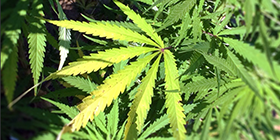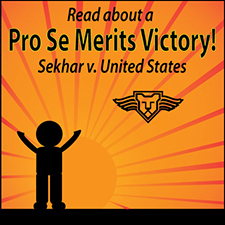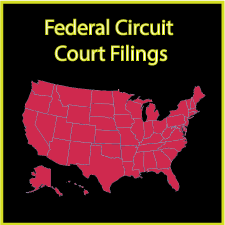Petition of the Month, July 2019:
Bryan Krumm v. the Drug Enforcement Agency (DEA)
Recognizing the Medical Benefits of Marijuana
The Supreme Court Press “Petition of the Month”TM for August 2019 is Bryan Krumm v. the Drug Enforcement Agency (DEA), Supreme Court Dkt. No. 18-1582, an appeal coming out of the United States Court of Appeals for the District of Columbia. The petition was filed pro se by the petitioner Bryan Krumm,

Question Presented:
1. Can the Attorney General and DEA continue Schedule 1 placement of Cannabis now that it has “accepted medical use” in 33 States, the District of Columbia and the National Academies of Sciences?
2. Did the Court ofAppeals err by granting deference to DEA’s decision to limit witness testimony in spite of an ongoing pattern of witness tampering?
3. Did the Court of Appeals err by denying Krumm’s Motion for Writ of Mandamus ordering the DEA to exempt Cannabis from federal control under the CSA?


Thank you for discussing your case with us. You have been on the forefront of the marijuana rights movement for years now. Can you explain your background, how you got involved with marijuana rights, and any accomplishments in this field prior to this present case. |
|
I was born in Washington DC. My biological father gave up rights to me when I was 6 years old and I was raised by an abusive stepfather. I began drinking in high school, which increased in college. Two years and 23 hours of F’s later I was kicked out of UNM. I went to work in the customer service department of Sears and soon realized I wanted to go back to school I joined the Army on a 2 year enlistment and in 1986 I returned to school. However, due to continued alcohol abuse I nearly failed out of school again. That’s when I discovered that unlike alcohol, Cannabis stopped the arousal symptoms and allowed me to focus on school. Unfortunately, the medication I needed to function was illegal, so I became active in the Cannabis legalization movement. I changed the focus of my studies and suddenly found myself making the honor roll and dean's list. After California legalized Medical Cannabis use in 1996, I refocused my advocacy efforts to Medical Cannabis rather than outright legalization. I began lobbying the State Legislature and Governor Johnson. I sought support from the New Mexico Board of Nursing, the Pharmacy Board, the Medical Society and the Nurses Association. In 1999 I helped draft a bill that is the basis of New Mexico's Medical Cannabis law and I included language allowing Nurse Practitioners to refer to the program. in 2006 I graduated as a Psychiatric Nurse Practitioner and in 2007 New Mexico became the 13th State to allow Medical Cannabis use. As a Psychiatric Nurse Practitioner I have found Cannabis to be the only medication effective for treating PTSD. I have helped thousands of patients avoid, reduce and/or eliminate the use of far more dangerous pharmaceuticals. In January 2016, the Nurse Practitioner Journal published my article Cannabis for Post-Traumatic Stress Disorder: A Neurological Approach to Treatment, which quickly became the highest ranked article in the history of the Journal, and in 2017, I became their “Author of the Year”. This article remains in the top 2% of over 13 million research outputs tracked by Altmetric. I am nationally recognized as an expert on the use of Cannabis for PTSD and I have spoken at medical conferences across the country. In August of 2016, the DEA settled a Rescheduling Petition I filed in 2009. DEA was forced to admit that Cannabis is not a “gateway drug”, doesn’t cause psychosis, doesn’t cause lung cancer and doesn’t cause cognitive decline with aging. More importantly, HHS and FDA told DEA they had to stop blocking research, and had to allow more people to grow Cannabis for research and DEA was forces to change these policies. FDA was also forced to admit that due to DEAs evidentiary restrictions “it is beyond the scope of this review to determine whether these data demonstrate that marijuana has a currently accepted medical use in the United States” and Cannabis remains illegally mired in Schedule 1 of the CSA. When Jeff Sessions took office in 2017, he ordered the head of DEA, Chuck Rosenberg, to block implementation of those policy changes, in violation of the law. In May of 2017 I filed a new Rescheduling Petition, citing new evidence from the National Academy of Sciences which found conclusive evidence that Cannabis is safe and effective for treating pain. That September, Chuck Rosenberg resigned, stating he doesn’t trust this administration to follow the law. After 6 months of delay, I sent a letter to the new head of DEA, Robert Patterson, demanding my petition either be approved, denied or forwarded for review. Two months later he denied my Petition, citing DEA’s own determination that the expert opinions of the National Academies of Science are just as irrelevant as the Laws of 33 States and District of Columbia. I filed a Petition for Writ of Mandamus with the Court of Appeals in DC arguing that the DEA and Attorney General cannot be trusted to obey the law and therefore Cannabis must be exempted from control under the CSA. I requested that control be turned over to the States to regulate medical, recreational, religious and industrial use of Cannabis. Shortly after that, Patterson resigned, saying he doesn’t know enough about marijuana to be head of the DEA. The three judge Panel assigned to my case denied my motion for Writ of Mandamus so I filed a petition for Rehearing En Banc which was also denied, so now I have appealed to the Supreme Court. |
|
The current case involves science and regulation. Can you explain how DEA regulation changes if and when a substance has an accepted medical use, and how it applies to marijuana? |
|
The issue of “accepted medical use” is discussed in both Gonzales v. Raich and United States v. Oakland Cannabis Buyers Cooperative. The Attorney General/DEA can include a drug in Schedule 1 only if the drug “has no currently accepted medical use in treatment in the United States,” “has a high potential for abuse,” and has “a lack of accepted safety for use . . . under medical supervision.” As in Alliance for Cannabis Therapeutics v. DEA, my case turns on the appropriate definition and application of the phrase “accepted medical use”. The questions of safety and efficacy were settled in 1988 by the DEA's own administrative law judge, when reviewing a previous rescheduling petition filed by the Alliance for Cannabis Therapeutics. The only question that remained was that of "accepted medical use”. Under the CSA, the Attorney General/DEA cannot put Cannabis into Schedule 1 if it has “any” “accepted medical use”. Unfortunately, for purposes of the CSA, the DEA has defined “accepted medical use”, as requiring Phase 3 clinical trials. At the same time, they have illegally continued to prohibit such research from being conducted. DEA has created an arbitrary definition that utilizes circular logic to ensure Cannabis can never be recognized as having “accepted medical use in the United States”. DEA only accepts evidence from the FDA and then manipulates the testimony of the FDA to ensure the outcome they desire. This illegal witness tampering has now risen to the level that FDA admits that it is beyond the scope of their reviews to determine if Cannabis has “accepted medical use”. DEAs argument that Cannabis has “no accepted medical use in the United States” is an outright lie. Thirty-three States and the District of Columbia have accepted the medical use of Cannabis. Thousands of medical providers have referred patients to State Medical Cannabis Programs because they know that Cannabis is safe and effective for medical use. Now the National Academies of Science, a division of the federal government, has concluded that Cannabis has “accepted medical use”. Yet these voices have been ignored by the Attorney General and DEA. The AG and DEA have tampered with witness testimony and have blocked implementation of policy changes in direct violation of the law. Their actions are more indicative of a RICO operation, than those of legitimate law enforcement. As discussed in Gonzales v. Oregon, the CSA gives the states the authority to determine “accepted medical use”. Neither DEA nor the Attorney General have the authority to regulate medical practice in general. DEA ignores the extensive scientific record, and boldly proclaims that because it has blocked Phase 3 Cannabis research, that no evidence exists to prove “accepted medical use” of Cannabis. Therefore, I have posed a strictly legal question which does not require any further scientific inquiry. Does the determination of 33 States and the scientific conclusions of experts at the National Academies of Science provide proof of “accepted medical use in the United States”. The answer is surely “yes”. |
|
What is the process by which you filed a challenge to the DEA regarding the treatment of marijuana? What decision did the DEA make? |
|
On May 22, 2017, I filed a rescheduling petition with the DEA requesting that the DEA immediately remove Cannabis from control under the CSA and transfer authority for regulating medical, recreational and religious use of Cannabis to the States. A few months later, Chuck Rosenberg resigned as the head of the DEA. November 22nd I sent a letter to the new head of DEA, Robert Patterson, informing him that it had been 6 months since I had filed my rescheduling petition and that the Administrative Procedure Act required him to act on my petition "within a reasonable period of time”. On January 16, 2018 Patterson denied the petition, claiming that the new findings from the National Academies of Science were irrelevant because they were based only on reviews of existing evidence and not on new Phase 3 clinical studies. Patterson also argued that I had failed to address the issues of safety and efficacy and had focused the petition only on “accepted medical use”. |
|
You then appealed the decision to the U.S. Court of Appeals for the D.C. Circuit. What did the circuit court decide? |
|
On February 12, 2018 I filed a petition for review of Patterson’s decision with the U.S. Court of Appeals for the D.C. district and on May 1st I filed a Petition for Writ of Mandamus. A few months later Patterson resigned as head of the DEA claiming he doesn’t know enough about marijuana to head the agency. My petition was denied on September 10th by a 3 judge panel, disposing of the petition for review without oral argument on the basis of the presentations in the briefs. On September 24th The Court ordered that the petition for review be denied and ruled that I had failed to show that the Drug Enforcement Administration (“DEA”) acted arbitrarily and capriciously in denying my petition to reschedule marijuana under the Controlled Substances Act, citing the 5-part test approved in Americans for Safe Access v. DEA. The Court further ruled that I had not shown that the DEA’s application of the test in this case was arbitrary and capricious. In addition, petitioner’s argument that the DEA was required to engage in public notice and comment prior to denying his rescheduling petition was considered unavailing because neither the Controlled Substances Act nor the Administrative Procedure Act requires notice and comment prior to denying such a petition. I filed a petition for Rehearing en Banc on October 31st, that was denied January 17, 2019. |

How do you react to the reasoning/logic of the DEA and the D.C. Circuit decisions. Was it based on some consistent internal logic, or do you think it was a work around decision to get around the fact that marijuana is now accepted as having medical uses? |
|
The DEA decision is a clear work around decision based on the illegal manipulation of witness testimony to ensure continued prohibition of Cannabis. They only allow testimony about “accepted medical use” to come from the FDA while barring the FDA from considering the vast quantities of research and epidemiological evidence. The DEA ignores the laws of 33 States and DEA enforces its own “medical opinions” over the expert opinions of medical providers and scientists. Not only is the DEA violating US law, they are also in violation of the Single Convention Treaty on Narcotic Drugs which prohibits the United States from banning drugs with accepted medical use. The Court erred by granting deference to DEA’s decision to interfere with the rights of States to regulate medical practice, in violation Gonzales v Oregon. The Court further failed to address DEA’s illegal witness tampering and decades of lying to the Courts by claiming “Cannabis has no accepted medical use in the United States”. The DEAs illegal manipulation of witnesses and of the courts has cost countless American their lives, sacrificed to DEAs “War on Drugs”. |
|
Your petition is based upon the Court’s precedent in Gonzales v. Oregon, 546 U.S. 243. Can you explain some of the facts and the legal holding of that case and how it applies to your case. |
|
This case sets up what may be one of the most important States rights cases in a generation. The DEA and Attorney General have chosen to illegally ignore the laws of 33 States and the District of Columbia. Gonzales v Oregon ruled that the Federal government cannot interfere with Oregon’s Physician Assisted Suicide Law, allowing Oregon to become the first State to legalize physician assisted suicide, and opening the door for other States to follow. The Court found that although the Attorney General does have rulemaking power to fulfill his duties under the CSA, he is not authorized to block legitimate medical standards for care and treatment of patients that is specifically authorized under state law. As noted in Gonzales v. Oregon, the CSA explicitly contemplates a role for the States in regulating controlled substances, as evidenced by its pre-emption provision. “No provision of this subchapter shall be construed as indicating an intent on the part of the Congress to occupy the field in which that provision operates . . . to the exclusion of any State law on the same subject matter which would otherwise be within the authority of the State, unless there is a positive conflict between that provision . . . and that State law so that the two cannot consistently stand together.” Thirty-three States and the District of Columbia have all accepted Cannabis as having medical use. However, the DEA wants to read the statutory language of the CSA to exclude “States” from the meaning of “in the United States” and boldly proclaim that “Cannabis has no accepted medical use in the United States”. This is contrary to the ruling of the United States Supreme Court in Gonzales v. Oregon. The DEA is dictating to the States which substances shall have accepted medical use in direct violation of Congress’ mandate to “regulate” medical practice, not “define” it. DEA ignores the extensive scientific record, tampers with witness testimony and lies to the courts in order to prohibit the use of a lifesaving medication. |
|
How does the 10th Amendment figure into your case – i.e. what deference is the DEA supposed to have to decisions by state medical boards? |
|
DEA claims to have the authority to decide whether or not cannabis has “accepted medical use in treatment in the United States", in blatant disregard of the Tenth Amendment. Bond v. United States addresses that “The principles of limited national powers and state sovereignty are intertwined. While neither originates in the Tenth Amendment, both are expressed by it.” Gonzales v. Oregon confirms that the States are allowed great latitude under their police powers to legislate as to the protection of the lives, limbs, health, comfort, and quiet of all persons. The Attorney General has rulemaking power to fulfill his duties under the CSA and is not authorized to make a rule declaring illegitimate a medical standard for care and treatment of patients that is specifically authorized under state law. The CSA is also specific as to the manner in which the Attorney General must exercise this authority: “decisions regarding scheduling shall be made on the record after opportunity for a hearing pursuant to the rulemaking procedures prescribed by the Administrative Procedure Act.” The Appeals Court ruled that I am not entitled to a hearing and it is OK to disallow testimony from 33 States and from experts in the field of Medical Cannabis. |
|
Your case also involves what you state is a lack of candor between the DEA and the National Academy of Sciences. How is science supposed to be shared between these agencies and how was it handles in your case? |
|
|
The DEA has refused to consider the conclusive findings of the National Academy of Sciences, which now accepts the medical use of Cannabis. This is in direct violation of the Information Quality Act (Data Quality Act). Under this act, the term "quality" encompasses "utility," "objectivity," and “integrity.” Information must be presented in an accurate, clear, complete, unbiased manner and based on sound research methods. "Influential scientific information" that has a substantial impact on important public policies must be reproducible to demonstrate its objectivity. DEA should be required to defer to the findings of the National Academy of Sciences but instead both the DEA and AG have asserted their own biased opinions over the findings of the scientific and medical communities. |
|
If your appeal is not taken and reversed, what is the implication for the legalization of marijuana? |
|
|
Even if my appeal is not accepted and reversed it will only delay the inevitable legalization of Cannabis in the United States. Unfortunately, more Americans will die from lack of lifesaving medication while congress debates the merits of legalization, but Cannabis will eventually be legalized not only for medical use, but also industrial, recreational and religious use. However, my efforts will not end with a negative decision from the Supreme Court. If my appeal is not accepted and reversed I plan to request an investigation by the International Criminal Court (ICC) into human rights abuses by those who are blocking access to this medication. The ICC compliments the national criminal justice systems and it can investigate and, where warranted, prosecute and try individuals if the State concerned does not, cannot or is unwilling genuinely to do so. The United States is a signatory to the Single Convention on Narcotic Drugs of 1961, as amended in 1972. This international treaty prohibits the Attorney General, or by proxy the head of the DEA, from denying medical and scientific use of Cannabis. By continuing to ban the Medical Cannabis now that it has “accepted medical use” the head of the DEA and the Attorney General are violating provisions of the treaty recognizing “that the medical use of narcotic drugs continues to be indispensable for the relief of pain and suffering and that adequate provision must be made to ensure the availability of narcotic drugs for such purposes”. Thousands of Americans die each year because they are denied access to life saving medication by the DEA and AG. Specific to this case, the illegal actions of Robert Patterson and Jeff Sessions, who have now been replaced by Uttam Dhillon and Bob Barr, and who continue to ignore their legal obligations to allow medical use of Cannabis. |
 Thirty-three States and the District of Columbia have accepted the medical use of Cannabis. Thousands of medical providers have referred patients to State Medical Cannabis Programs because they know that Cannabis is safe and effective for medical use. Now the National Academies of Science, a division of the federal government, has concluded that Cannabis has “accepted medical use”. Yet these voices have been ignored by the Attorney General and DEA. The AG and DEA have tampered with witness testimony and have blocked implementation of policy changes in direct violation of the law. - Bryan Krumm
Thirty-three States and the District of Columbia have accepted the medical use of Cannabis. Thousands of medical providers have referred patients to State Medical Cannabis Programs because they know that Cannabis is safe and effective for medical use. Now the National Academies of Science, a division of the federal government, has concluded that Cannabis has “accepted medical use”. Yet these voices have been ignored by the Attorney General and DEA. The AG and DEA have tampered with witness testimony and have blocked implementation of policy changes in direct violation of the law. - Bryan KrummCan you discuss your base of support. My understanding is that you received support via Go Fund Me. How did you acquire this support? What do you want to say to those who supported you ? |
|
|
Because of my long history of advocacy, the successes I’ve had at the State and Federal levels, and my contributions to the medical profession, I have developed a broad network of supporters. I reached out to these supporters via both email and social media to ask for assistance in paying for the filing and printing of this case. My support came from those who believe we need to take a strong stand against the prohibitionists who have caused so much harm to so many Americans. It has been my experience that attorneys tend to be too polite. Rather than prosecuting the crimes of the DEA and AG, attorneys politely target technical issues, a strategy which thus far has failed to produce any substantive changes in Medical Cannabis laws at the federal level. I stand up to the DEA and AG to speak truth to their power and in 2016 I forced DEA to adopt significant policy changes. Although Jeff Sessions ordered DEA to illegally block implementation of those policy changes, due to ongoing political and legal pressure the DEA recently announced that they will stop blocking Medical Cannabis research and will approve new producers of Cannabis for research. People believe in what I am doing and they donated to my GoFundMe campaign to help make this step happen. The faith and assistance provided by my supporters is a driving force behind my advocacy and I have great appreciation for all those who have who have provided me with both emotional and financial support. Without them, this would not be possible. |
|
We’d like to ask you about your experience working with the Supreme Court Press. Can you offer any feedback on the quality, customer service, expertise, etc.? |
|
This case may not have happened if not for the assistance of Supreme Court Press. My initial filing was sent back by the Clerk due to formatting errors. It seems like the rules of the court have become consistently more difficult to follow as I have advanced through various levels of both State and Federal Courts. I’m not an attorney, so I never had the opportunity to study the rules of the various courts. Supreme Court Press was able to seamlessly edit, format and print the required 6x9 inch booklets, making sure all the rules were followed. They reformatted everything in the Appendix in order to reduce the documents from 8.5x11, while preserving proper text size. I could not have partnered with a better printer for my needs. I tried going through Staples for printing on my first try and it didn’t work out so well. I would like to thank Supreme Court Press, and especially Geary, for taking the time to understand my issues and ensure my needs were met. |


---Bryan-Krumm.png)
---ZoeSpencer.png)


